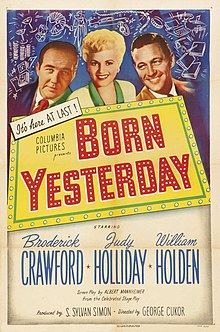
Back ولدوا بالأمس (فيلم) Arabic مولوده امبارح (فيلم 1950) ARZ کور-کورانه AZB বর্ন ইস্টারডে (১৯৫০-এর চলচ্চিত্র) Bengali/Bangla Nascuda ahir Catalan Včera narození Czech Die ist nicht von gestern German Γεννημένη Χθες Greek Born Yesterday (1950) Esperanto Nacida ayer (película de 1950) Spanish
| Born Yesterday | |
|---|---|
 Theatrical release poster | |
| Directed by | George Cukor |
| Written by | Albert Mannheimer Garson Kanin (uncredited) |
| Based on | Born Yesterday 1946 play by Garson Kanin |
| Produced by | S. Sylvan Simon |
| Starring | Judy Holliday Broderick Crawford William Holden |
| Cinematography | Joseph Walker |
| Edited by | Charles Nelson |
| Music by | Frederick Hollander |
Production company | Columbia Pictures |
| Distributed by | Columbia Pictures |
Release date |
|
Running time | 102 minutes |
| Country | United States |
| Language | English |
| Box office | $4.15 million (US rentals)[1] |
Born Yesterday is a 1950 American comedy-drama film directed by George Cukor, based on the 1946 stage play of the same name by Garson Kanin. The screenplay was credited to Albert Mannheimer. According to Kanin's autobiography, Cukor did not like Mannheimer's work, believing it lacked much of the play's value, so he approached Kanin about adapting a screenplay from his own play. Because of legal entanglements, Kanin did not receive screen credit.[2][3]
The film tells the story of an uneducated young woman, Billie Dawn (played by Judy Holliday, in an Oscar-winning performance) and an uncouth, older, wealthy junkyard tycoon, Harry Brock (Broderick Crawford) who comes to Washington to try to "buy" a congressman. When Billie embarrasses him socially, Harry hires journalist Paul Verrall (William Holden) to educate her. In the process, Billie learns how corrupt Harry is, and eventually falls in love with Paul.
The film was produced and released by Columbia Pictures. Kanin frequently stated that Harry Brock was modeled on Columbia production chief Harry Cohn, with whom Kanin had a long and testy relationship. According to Cohn biographer Bob Thomas, Cohn knew of Kanin's attribution but didn't care about it. In 2012, Born Yesterday was deemed "culturally, historically, or aesthetically significant" by the United States Library of Congress and selected for preservation in the National Film Registry.[4][5]
- ^ 'The Top Box Office Hits of 1951', Variety, January 2, 1952
- ^ Osborne, Robert. Outro to the Turner Classic Movies presentation of the film (June 1, 2014)
- ^ Thomson, David. Have You Seen...?, 2008, London: Allen Lane, p118
- ^ "Complete National Film Registry Listing". Library of Congress. Retrieved 2020-05-27.
- ^ "2012 National Film Registry Selections Showcased in January". Library of Congress. Retrieved 2020-04-23.